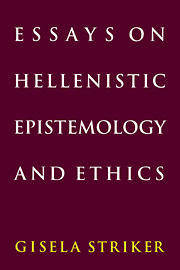Book contents
- Frontmatter
- Contents
- Preface
- Acknowledgments and essay sources
- List of abbreviations: Frequently cited names and titles
- EPISTEMOLOGY
- 1 Methods of sophistry
- 2 Kριτήριον τῆς ἀληθείας
- 3 Epicurus on the truth of sense impressions
- 4 Sceptical strategies
- 5 The Ten Tropes of Aenesidemus
- 6 On the difference between the Pyrrhonists and the Academics
- 7 The problem of the criterion
- ETHICS
- Name index
- Index of passages cited
3 - Epicurus on the truth of sense impressions
Published online by Cambridge University Press: 05 June 2012
- Frontmatter
- Contents
- Preface
- Acknowledgments and essay sources
- List of abbreviations: Frequently cited names and titles
- EPISTEMOLOGY
- 1 Methods of sophistry
- 2 Kριτήριον τῆς ἀληθείας
- 3 Epicurus on the truth of sense impressions
- 4 Sceptical strategies
- 5 The Ten Tropes of Aenesidemus
- 6 On the difference between the Pyrrhonists and the Academics
- 7 The problem of the criterion
- ETHICS
- Name index
- Index of passages cited
Summary
Of the three statements that often serve to epitomize Epicurean philosophy – at least for polemical purposes – two seem to be reasonably easy to understand: “The universe consists of bodies and void,” for physics; and “Pleasure is the highest good,” for ethics. The third, epistemological one, however, which is usually quoted in English as “All sensations are true,” has been the subject of some controversy and various interpretations by recent commentators.
In this paper I will try to do three things. First, I will try to make a suggestion as to what might have been Epicurus' own wording of his thesis.
Second, I will examine what seems to be becoming a standard interpretation in recent literature, namely the view that the word ἀληθἑς in this context must be taken to mean “real” rather than “true.” I shall try to show that this interpretation is not as firmly based as it might seem to be.
Third, I will propose a fresh interpretation, taking ἀληθές in the traditional sense of “true,” which places Epicurus' thesis in the epistemological debate of his day, but which avoids some objections raised against earlier versions of the traditional view.
Difficulties begin with the words themselves. We do not have Epicurus' own version of his famous dictum, but it is fairly obvious from the consensus of our sources that he must have said something to the effect either that αἰσθήσεις or that all ϕαντασίαι are true.
- Type
- Chapter
- Information
- Essays on Hellenistic Epistemology and Ethics , pp. 77 - 91Publisher: Cambridge University PressPrint publication year: 1996
- 2
- Cited by



